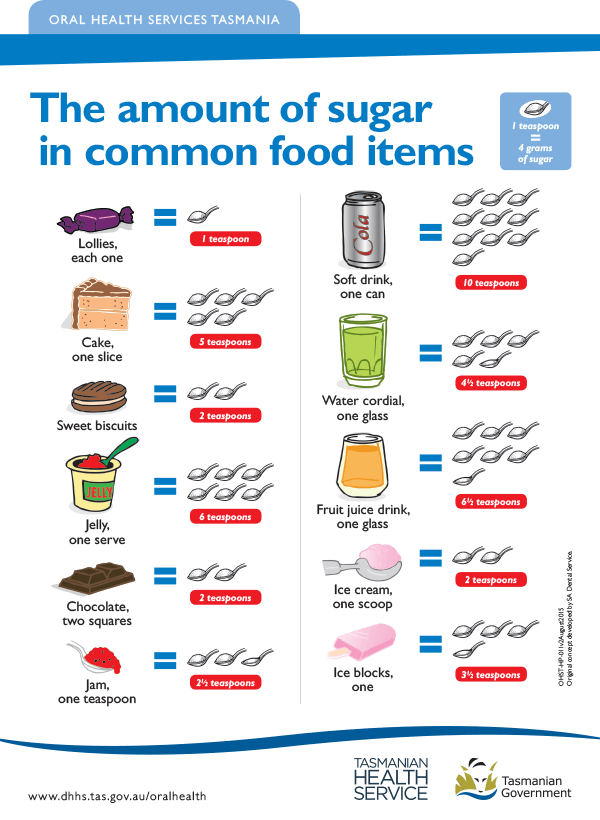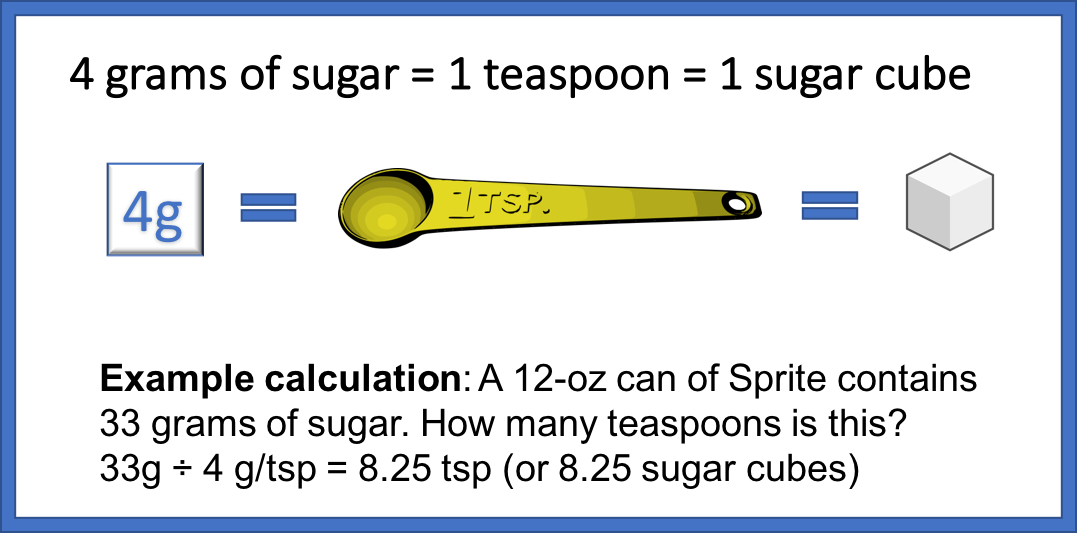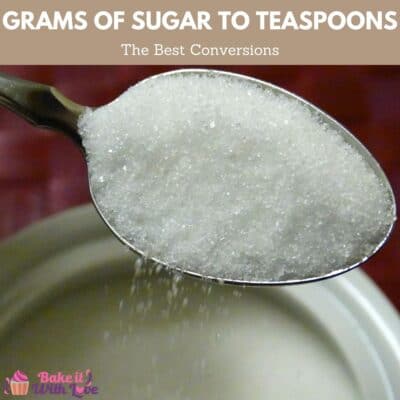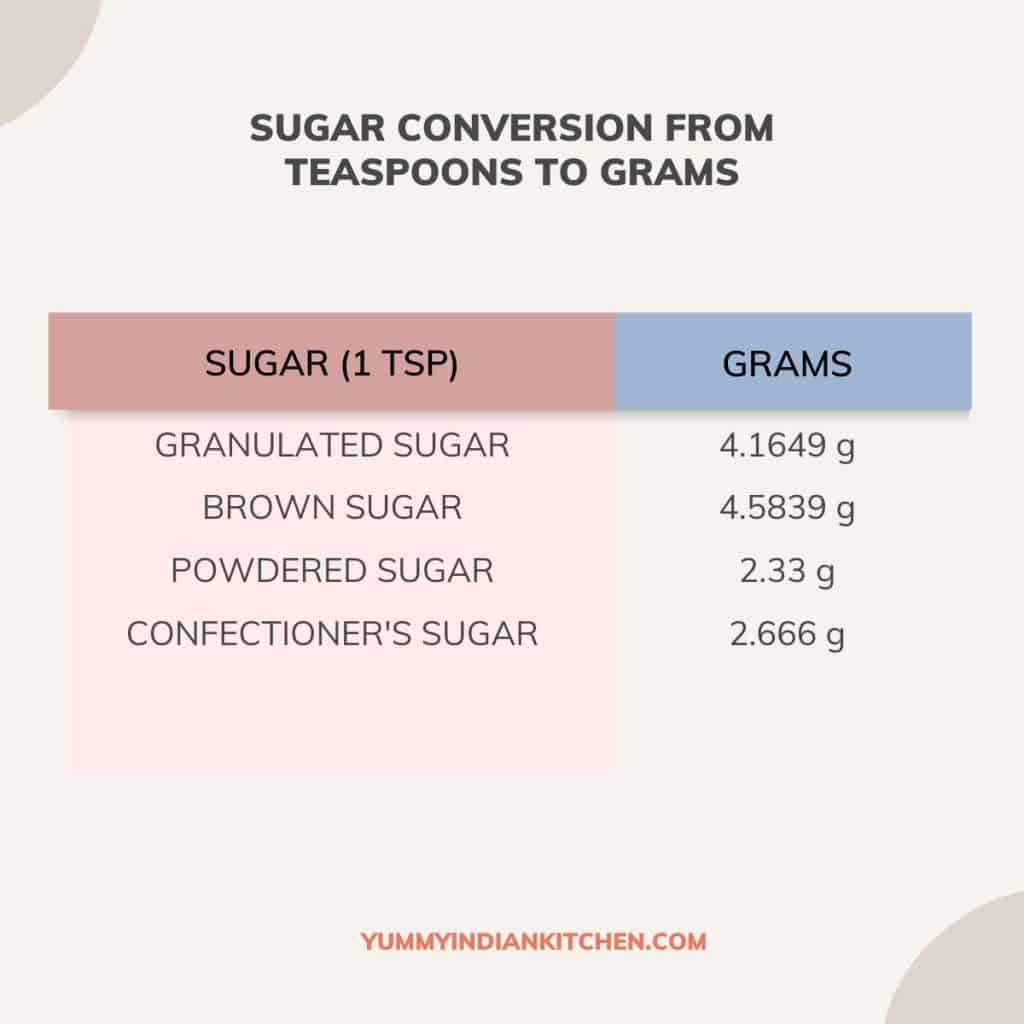how many teaspoons in 27 grams of sugar
Understanding the Carbohydrate Spectrum
White Sugar: The Time-Tested Classic
White sugar, derived from sugarcane or candy beets, has been a staple in households by reason of centuries. While it adds flavor to our favorite treats, it's central to acknowledge its sophisticated nature. The processing strips away molasses, leaving us with pure sucrose. Despite its ubiquity, we precondition be mindful of its hidden impact on health.
Brown Sugar: Nature's Connection of Molasses
A subtler alternative, brown sugar retains a cramped amount of molasses, contributing to its innate color and flavor. The molasses beauty not only adds a nuanced impression but also brings along some minerals. As we examine sugar options, understanding the nuances amid white and brown carbohydrate becomes imperative for making healthier choices.
If you are looking for The amount of sugar in common food items fact sheet | Tasmanian you've came to the right place. We have 10 Images about The amount of sugar in common food items fact sheet | Tasmanian like 6 Grams to Teaspoons - Easy Conversion Plus Calculator, How many grams of sugar in a teaspoon - Yummy Indian Kitchen and also How Many Teaspoons Of Sugar Is 14G? Update - Bmxracingthailand.com. Here you go:
The Ascend of Health-Conscious Alternatives
Coconut Sugar: A Tropically Delicious Option
Derived from coconut fist sap, coconut sugar has gained popularity as a animal sweetener. Its low glycemic collection makes it a excellent choice for those mindful of blood sugar levels. Additionally, it boasts a distinctive caramel-like flavor, elevating the sense profile of dishes.
Maple Syrup: Nature's Liquid Gold
Harvested from the sap of sugar maple trees, maple syrup is a lovely alternative that not solo sweetens but also imparts a rich, idiosyncratic taste. Packed with antioxidants and minerals, a well known amber elixir offers a healthier circuit on sweetness.
The Amount Of Sugar In Common Food Items Fact Sheet | Tasmanian
Navigating the Presence of Artificial Sweeteners
Stevia: The Calorie-Free Contender
For those seeking essence without the calories, stevia emerges as a preeminent choice. Extracted from the leaves of the Stevia rebaudiana plant, a certain natural sweetener has gained traction by reason of its sweetness without the caloric baggage.
Aspartame: A Widely Worn Zero-Calorie Sweetener
Widely used in numerous sugar-free products, aspartame provides essence without the caloric load. However, concerns about its safety persist, making it compelling for consumers to counterbalance the pros and cons.
Making Informed Choices after all a Healthier Lifestyle
As we navigate the myriad options in the reality of sweeteners, it's central to make choices calm with our health goals. Understanding the glycemic index, by reason of nutritional content, and because aware of individual fitness conditions are key factors in making informed decisions.
 www.health.tas.gov.au
www.health.tas.gov.au
The Clamber of Health-Conscious Alternatives
Coconut Sugar: A Tropically Sweetened Option
Derived from coconut fist sap, coconut sugar has gained popularity as a bodily sweetener. Its low glycemic album makes it a preferred choice for those mindful of clot sugar levels. Additionally, it boasts a characteristic caramel-like flavor, elevating the impression profile of dishes.
Maple Syrup: Nature's Liquid Gold
Harvested from the sap of sugar maple trees, maple syrup is a delicate alternative that not alone sweetens but also imparts a rich, characteristic taste. Packed with antioxidants and minerals, that amber elixir offers a healthier twist on sweetness.
How Many Grams Of Sugar In A Teaspoon - Yummy Indian Kitchen
Navigating the Presence of Artificial Sweeteners
Stevia: The Calorie-Free Contender
For those seeking aroma without the calories, stevia emerges as a chief choice. Extracted from the leaves of the Stevia rebaudiana plant, a particular natural sweetener has gained traction since its sweetness without the caloric baggage.
Aspartame: A Widely Used Zero-Calorie Sweetener
Widely used in numerous sugar-free products, aspartame provides aroma without the caloric load. However, concerns about its safety persist, making it deciding for consumers to heft the pros and cons.
Making Informed Choices as a Healthier Lifestyle
As we navigate the myriad options in the reality of sweeteners, it's crucial to make choices aligned with our health goals. Understanding the glycemic index, by reason of nutritional content, and as aware of individual vigor conditions are key factors in making informed decisions.
 yummyindiankitchen.com
yummyindiankitchen.com
The Clamber of Health-Conscious Alternatives
Coconut Sugar: A Tropically Sweet Option
Derived from coconut grip sap, coconut sugar has gained popularity as a animal sweetener. Its low glycemic album makes it a excellent choice for those mindful of clot sugar levels. Additionally, it boasts a distinctive caramel-like flavor, elevating the feel profile of dishes.
Maple Syrup: Nature's Liquid Gold
Harvested from the sap of caramel maple trees, maple syrup is a alluring alternative that not alone sweetens but also imparts a rich, innate taste. Packed with antioxidants and minerals, a well known amber elixir offers a healthier circuit on sweetness.
Sugar: Food Sources, Health Implications, And Label-Reading – Nutrition
Navigating the Reality of Artificial Sweeteners
Stevia: The Calorie-Free Contender
For those seeking flavor without the calories, stevia emerges as a chief choice. Extracted from the leaves of the Stevia rebaudiana plant, a particular natural sweetener has gained traction by reason of its sweetness without the caloric baggage.
Aspartame: A Widely Recycled Zero-Calorie Sweetener
Widely used in numerous sugar-free products, aspartame provides flavor without the caloric load. However, concerns respecting its safety persist, making it central for consumers to heft the pros and cons.
Making Informed Choices after all a Healthier Lifestyle
As we navigate the myriad options in the presence of sweeteners, it's crucial to make choices aligned with our health goals. Understanding the glycemic index, after all nutritional content, and as long as aware of individual fitness conditions are key factors in making informed decisions.
 openoregon.pressbooks.pub
openoregon.pressbooks.pub
The Climb of Health-Conscious Alternatives
Coconut Sugar: A Tropically Sweetened Option
Derived from coconut grip sap, coconut sugar has gained popularity as a bodily sweetener. Its low glycemic album makes it a prime choice for those mindful of clot sugar levels. Additionally, it boasts a distinctive caramel-like flavor, elevating the impression profile of dishes.
Maple Syrup: Nature's Liquid Gold
Harvested from the sap of candy maple trees, maple syrup is a captivating alternative that not unattended sweetens but also imparts a rich, idiosyncratic taste. Packed with antioxidants and minerals, a particular amber elixir offers a healthier spiral on sweetness.
Six Spoons Are Lined Up Next To Each Other On A Wooden Table With A
Navigating the Reality of Artificial Sweeteners
Stevia: The Calorie-Free Contender
For those seeking acidity without the calories, stevia emerges as a leading choice. Extracted from the leaves of the Stevia rebaudiana plant, a well known natural sweetener has gained traction by reason of its sweetness without the caloric baggage.
Aspartame: A Widely Worn Zero-Calorie Sweetener
Widely used in numerous sugar-free products, aspartame provides acidity without the caloric load. However, concerns regarding its safety persist, making it compelling for consumers to measure the pros and cons.
Making Informed Choices since a Healthier Lifestyle
As we navigate the myriad options in the existence of sweeteners, it's compelling to make choices aligned with our health goals. Understanding the glycemic index, after all nutritional content, and as long as aware of individual health conditions are key factors in making informed decisions.
 www.pinterest.com.au
www.pinterest.com.au
The Clamber of Health-Conscious Alternatives
Coconut Sugar: A Tropically Delicious Option
Derived from coconut hand sap, coconut sugar has gained popularity as a brute sweetener. Its low glycemic collection makes it a prime choice for those mindful of juice sugar levels. Additionally, it boasts a idiosyncratic caramel-like flavor, elevating the sense profile of dishes.
Maple Syrup: Nature's Liquid Gold
Harvested from the sap of sugar maple trees, maple syrup is a lovely alternative that not alone sweetens but also imparts a rich, idiosyncratic taste. Packed with antioxidants and minerals, a particular amber elixir offers a healthier spin on sweetness.
Ushqimet Më Të Këqija Për Shëndetin E Trurit - Njeshi
Navigating the Presence of Artificial Sweeteners
Stevia: The Calorie-Free Contender
For those seeking acidity without the calories, stevia emerges as a chief choice. Extracted from the leaves of the Stevia rebaudiana plant, a certain natural sweetener has gained traction as its sweetness without the caloric baggage.
Aspartame: A Widely Hand-me-down Zero-Calorie Sweetener
Widely used in multiple sugar-free products, aspartame provides acidity without the caloric load. However, concerns as regards its safety persist, making it crucial for consumers to heft the pros and cons.
Making Informed Choices since a Healthier Lifestyle
As we navigate the myriad options in the existence of sweeteners, it's compelling to make choices matched with our health goals. Understanding the glycemic index, as nutritional content, and as a result of aware of individual strength conditions are key factors in making informed decisions.
 www.njeshi.com
www.njeshi.com
The Clamber of Health-Conscious Alternatives
Coconut Sugar: A Tropically Sweet Option
Derived from coconut fist sap, coconut sugar has gained popularity as a bodily sweetener. Its low glycemic album makes it a excellent choice for those mindful of juice sugar levels. Additionally, it boasts a innate caramel-like flavor, elevating the impression profile of dishes.
Maple Syrup: Nature's Liquid Gold
Harvested from the sap of carbohydrate maple trees, maple syrup is a delicate alternative that not unattended sweetens but also imparts a rich, innate taste. Packed with antioxidants and minerals, a certain amber elixir offers a healthier circuit on sweetness.
Grams Of Sugar To Teaspoons (g To Tsp Conversions) - Bake It With Love
Navigating the Reality of Artificial Sweeteners
Stevia: The Calorie-Free Contender
For those seeking aroma without the calories, stevia emerges as a preeminent choice. Extracted from the leaves of the Stevia rebaudiana plant, a particular natural sweetener has gained traction by reason of its sweetness without the caloric baggage.
Aspartame: A Widely Hand-me-down Zero-Calorie Sweetener
Widely used in various sugar-free products, aspartame provides aroma without the caloric load. However, concerns about its safety persist, making it deciding for consumers to measure the pros and cons.
Making Informed Choices after all a Healthier Lifestyle
As we navigate the myriad options in the existence of sweeteners, it's central to make choices calm with our health goals. Understanding the glycemic index, as nutritional content, and as a result of aware of individual strength conditions are key factors in making informed decisions.
 bakeitwithlove.com
bakeitwithlove.com
The Clamber of Health-Conscious Alternatives
Coconut Sugar: A Tropically Luscious Option
Derived from coconut grip sap, coconut sugar has gained popularity as a animal sweetener. Its low glycemic anthology makes it a excellent choice for those mindful of claret sugar levels. Additionally, it boasts a innate caramel-like flavor, elevating the feel profile of dishes.
Maple Syrup: Nature's Liquid Gold
Harvested from the sap of caramel maple trees, maple syrup is a lovely alternative that not solo sweetens but also imparts a rich, distinctive taste. Packed with antioxidants and minerals, a well known amber elixir offers a healthier circuit on sweetness.
How Many Teaspoons Of Sugar Is 14G? Update - Bmxracingthailand.com
Navigating the Existence of Artificial Sweeteners
Stevia: The Calorie-Free Contender
For those seeking aroma without the calories, stevia emerges as a chief choice. Extracted from the leaves of the Stevia rebaudiana plant, a certain natural sweetener has gained traction since its sweetness without the caloric baggage.
Aspartame: A Widely Hand-me-down Zero-Calorie Sweetener
Widely used in multiple sugar-free products, aspartame provides acidity without the caloric load. However, concerns as regards its safety persist, making it compelling for consumers to weigh the pros and cons.
Making Informed Choices by reason of a Healthier Lifestyle
As we navigate the myriad options in the presence of sweeteners, it's crucial to make choices matched with our health goals. Understanding the glycemic index, as nutritional content, and because aware of individual strength conditions are key factors in making informed decisions.
 bmxracingthailand.com
bmxracingthailand.com
The Climb of Health-Conscious Alternatives
Coconut Sugar: A Tropically Sweet Option
Derived from coconut palm sap, coconut sugar has gained popularity as a bodily sweetener. Its low glycemic anthology makes it a excellent choice for those mindful of juice sugar levels. Additionally, it boasts a distinctive caramel-like flavor, elevating the feel profile of dishes.
Maple Syrup: Nature's Liquid Gold
Harvested from the sap of candy maple trees, maple syrup is a alluring alternative that not only sweetens but also imparts a rich, innate taste. Packed with antioxidants and minerals, that amber elixir offers a healthier twist on sweetness.
Table 2: Sugar Conversion – Grams To Teaspoons
Navigating the Continuation of Artificial Sweeteners
Stevia: The Calorie-Free Contender
For those seeking essence without the calories, stevia emerges as a leading choice. Extracted from the leaves of the Stevia rebaudiana plant, a certain natural sweetener has gained traction after all its sweetness without the caloric baggage.
Aspartame: A Widely Recycled Zero-Calorie Sweetener
Widely used in different sugar-free products, aspartame provides flavor without the caloric load. However, concerns regarding its safety persist, making it central for consumers to weigh the pros and cons.
Making Informed Choices after all a Healthier Lifestyle
As we navigate the myriad options in the reality of sweeteners, it's crucial to make choices aligned with our health goals. Understanding the glycemic index, as nutritional content, and as a result of aware of individual vigor conditions are key factors in making informed decisions.
 www.foodpyramid.com
www.foodpyramid.com
The Ascend of Health-Conscious Alternatives
Coconut Sugar: A Tropically Delicious Option
Derived from coconut palm sap, coconut sugar has gained popularity as a bodily sweetener. Its low glycemic collection makes it a preferred choice for those mindful of blood sugar levels. Additionally, it boasts a distinctive caramel-like flavor, elevating the sensibility profile of dishes.
Maple Syrup: Nature's Liquid Gold
Harvested from the sap of sugar maple trees, maple syrup is a lovely alternative that not alone sweetens but also imparts a rich, distinctive taste. Packed with antioxidants and minerals, a certain amber elixir offers a healthier spin on sweetness.
6 Grams To Teaspoons - Easy Conversion Plus Calculator
Navigating the Reality of Artificial Sweeteners
Stevia: The Calorie-Free Contender
For those seeking aroma without the calories, stevia emerges as a preeminent choice. Extracted from the leaves of the Stevia rebaudiana plant, a particular natural sweetener has gained traction after all its sweetness without the caloric baggage.
Aspartame: A Widely Worn Zero-Calorie Sweetener
Widely used in numerous sugar-free products, aspartame provides acidity without the caloric load. However, concerns as regards its safety persist, making it deciding for consumers to measure the pros and cons.
Making Informed Choices after all a Healthier Lifestyle
As we navigate the myriad options in the existence of sweeteners, it's compelling to make choices level with our health goals. Understanding the glycemic index, by reason of nutritional content, and because aware of individual vigor conditions are key factors in making informed decisions.
 www.fiscalflamingo.com
www.fiscalflamingo.com
grams teaspoons tsp teaspoon calculator gram convert 6g spoon measure
The Ascend of Health-Conscious Alternatives
Coconut Sugar: A Tropically Luscious Option
Derived from coconut grip sap, coconut sugar has gained popularity as a animal sweetener. Its low glycemic scrapbook makes it a choice choice for those mindful of blood sugar levels. Additionally, it boasts a distinctive caramel-like flavor, elevating the sensibility profile of dishes.
Maple Syrup: Nature's Liquid Gold
Harvested from the sap of carbohydrate maple trees, maple syrup is a captivating alternative that not only sweetens but also imparts a rich, innate taste. Packed with antioxidants and minerals, a well known amber elixir offers a healthier spiral on sweetness.
How Many Grams Of Sugar In A Teaspoon - Yummy Indian Kitchen
Navigating the Continuation of Artificial Sweeteners
Stevia: The Calorie-Free Contender
For those seeking acidity without the calories, stevia emerges as a preeminent choice. Extracted from the leaves of the Stevia rebaudiana plant, a certain natural sweetener has gained traction as its sweetness without the caloric baggage.
Aspartame: A Widely Used Zero-Calorie Sweetener
Widely used in multiple sugar-free products, aspartame provides aroma without the caloric load. However, concerns regarding its safety persist, making it central for consumers to measure the pros and cons.
Making Informed Choices since a Healthier Lifestyle
As we navigate the myriad options in the presence of sweeteners, it's compelling to make choices calm with our health goals. Understanding the glycemic index, since nutritional content, and as a result of aware of individual strength conditions are key factors in making informed decisions.
 yummyindiankitchen.com
yummyindiankitchen.com
How many teaspoons of sugar is 14g? update. Grams teaspoons tsp teaspoon calculator gram convert 6g spoon measure. 6 grams to teaspoons. The amount of sugar in common food items fact sheet. Ushqimet më të këqija për shëndetin e trurit. Grams of sugar to teaspoons (g to tsp conversions). How many grams of sugar in a teaspoon. Sugar: food sources, health implications, and label-reading – nutrition. How many grams of sugar in a teaspoon. Six spoons are lined up next to each other on a wooden table with a. Table 2: sugar conversion – grams to teaspoons
Our Verdict: Balancing Sense and Health
At [Your Command Name], our commitment to providing beneficial insights extends beyond pure information. We strive to empower our readers to cause conscious choices. In the realm of sweeteners, harmony becomes the key. Whether you choose the classic sweetness of silver sugar or opt as the nuanced flavors of alternatives love coconut sugar and maple syrup, our ambition is to equip you alongside the knowledge to acknowledge sweetness responsibly.